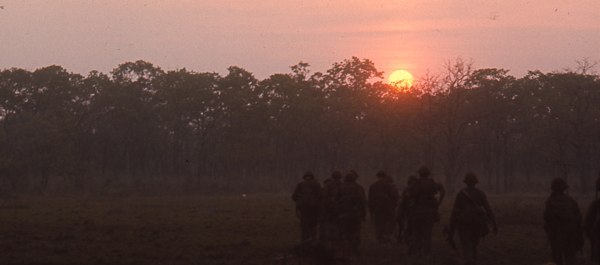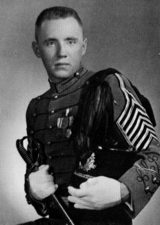
The images of that sad night while I was a cadet at Pennsylvania Military College have never left me.
There is an especially poignant scene about halfway through the 1982 film The Lords of Discipline. Based on the novel of the same name by Pat Conroy, the story is set in a fictionalized southern military college similar to The Citadel in the early to mid-1960s. Intertwined among the plot lines about the cloistered culture of military college life and the desegregation of a venerable and storied institution of the Old South, the Corps of Cadets learns of the death of a recent graduate, an army lieutenant who died in a training accident. Spontaneously the cadets stage a nighttime candlelight vigil outside the home of the dead lieutenant’s father, who happens to be the school’s superintendent. When I first saw this scene in the movie, it jerked me back to an almost parallel scene I was a part of in November 1965. Many similar scenes played out all too many times at the nation’s military colleges during the years of the Vietnam War.
In the fall of 1965, I had just entered Pennsylvania Military College (PMC), which, like The Citadel, was one of America’s leading state-sponsored or private military schools. Unlike the U.S. Military Academy at West Point, however, cadets at the military colleges pay tuition, room and board.
Like many others attending military colleges, I had tried to get into West Point, but had been unsuccessful. By early November, my classmates and I were struggling to keep our heads above water, trying to survive the combined challenges of the Fourth Class System and our first semester of college-level academics. Reminiscent of West Point, all military colleges have a rigorous initiation system for fourth class cadets, or first-year students, and Pennsylvania Military College was no exception. In fact, The Lords of Discipline fairly accurately portrays the strange and stress-filled lives of typical “Rooks” at PMC. We were all desperately counting down the days to the Thanksgiving break, when we would get at least a short respite from the pressures.
On one cold and gray afternoon in mid-November, whispered rumors started rippling through the campus. There had just been a huge and dreadful battle fought in Vietnam, one with many casualties. Since most of us aspired to become Army officers, the reality of Vietnam was always out there, but it seemed always to be just over the horizon, a distant and still somewhat vague menace.
 It was soon confirmed that one of the casualties was a recent PMC graduate, and it was just not any graduate—it was John Lance “Jack” Geoghegan, who graduated at the head of the Class of 1963. He had been the Cadet First Captain, the top cadet, the graduate with the greatest potential to go the farthest in the Army—all the way to the stars of the general officers’ ranks even. And now he was dead while still a lieutenant, killed in a far off and obscure sounding place called the Ia Drang Valley.
It was soon confirmed that one of the casualties was a recent PMC graduate, and it was just not any graduate—it was John Lance “Jack” Geoghegan, who graduated at the head of the Class of 1963. He had been the Cadet First Captain, the top cadet, the graduate with the greatest potential to go the farthest in the Army—all the way to the stars of the general officers’ ranks even. And now he was dead while still a lieutenant, killed in a far off and obscure sounding place called the Ia Drang Valley.
Though none of us fourth class cadets in the Class of 1969 had known Geoghegan, most of the seniors in the first class knew him well, and all the second class cadets had gone through their own Rook year while he had been the Cadet First Captain, a God-like figure in the self-contained universe of any military college. By that evening, the entire institution was in a collective state of shock. We each silently acknowledged the ultimate reality of the profession of arms. If someone like Jack Geoghegan could buy it, any of us could.
That evening at our usual end-of-the-day march to chow, we shuffled out to our brigade formation positions in the dark and cold. A deathly pall hung over us. The brig-ade was called to attention, and the usual formulaic reports rendered. Then the entire brigade did a left face in unison, but instead of the normal brisk march to the mess hall, we stepped off at the painfully slow mourning march pace of 60 steps per minute, as the cadet band’s bass drum beat out the time. We ate in silence that night, staring straight ahead at nothing.
Jack Geoghegan was PMC’s first Vietnam casualty. He had been commissioned a second lieutenant and was sent to Vietnam in August 1965. He was just three months into his deployment with the 1st Air Cavalry Division’s 1st Battalion, 7th Cavalry, under Lt. Col. Harold G. Moore, when he was killed. He was an only son and left behind a wife and a 6-month-old daughter.
We pretended to study and sleep that night, but it seemed like the ghosts of the Ia Drang battle were everywhere within the walls of the school. Seventy-nine U.S. soldiers had been killed by the morning of November 16, and 121 wounded. Geoghegan apparently was killed as he tended to the wounds of a comrade, while trying to secure Landing Zone X-Ray, and all but three of his men died that day. The fighting continued, and over the course of the next few days, the PMC cadets closely followed the battles of the Ia Drang Valley. A total of 234 Americans lost their lives in this first large-scale clash between the U.S. forces and North Vietnamese regular units. Before the war ended, too many graduates of PMC and other military institutions such as Vermont’s Norwich University, Virginia Military Institute (VMI), The Citadel and West Point would die on the battlefield, too.
Ironically, PMC’s last casualty of the Vietnam War was the institution itself. As the war dragged on and became less and less popular, so did all things military in America. By the early 1970s, enrollments were down and all of the traditional military colleges were under severe pressure. Norwich, VMI and The Citadel survived in the long run; PMC did not. In 1972 America’s second- oldest military college disbanded its Corps of Cadets and transformed itself into what today is Widener University.
At Pennsylvania Military College, I didn’t make it past that first year. I actually survived the initiation part of it, but the academic piece was a complete disaster by the time June 1966 rolled around. Three months later, I was in Basic Combat Training at Fort Dix, and six months to the day after I had enlisted I stepped off the plane at Bien Hoa. I soon headed down the road for Camp Bearcat to report in to the 2nd Battalion, 47th Infantry. Somehow I had known that day was coming sooner than later, ever since that cold November night 18 months earlier. I often wonder how my life might have played out if I had graduated with my PMC class and gone to Vietnam as a second lieutenant, much like Jack had, in the early 1970s, rather than as a private in 1967. I got my commission eventually, but it took a long time to get there.
The images of that sad night at PMC have never left me, but I am somewhat ashamed to admit that for an intervening period there I forgot Geoghegan’s name. Then in 1992, when I read Hal Moore’s and Joe Galloway’s great book We Were Soldiers Once….And Young, it all came rushing back to me. Years after that, when I was the editor of Vietnam magazine and when the movie We Were Soldiers came out, I had the privilege of corresponding with Barbara Johns, Jack Geoghegan’s widow.
I never knew Jack Geoghegan, but his was the first Vietnam War death that touched me personally. It wouldn’t be the last.
Maj. Gen. AUS (Ret.) David T. Zabecki, Ph.D., served as a rifleman in Vietnam, has authored numerous books of military history, is editor emeritus of Vietnam magazine and is an honorary senior research fellow in war studies at the University of Birmingham in England.




